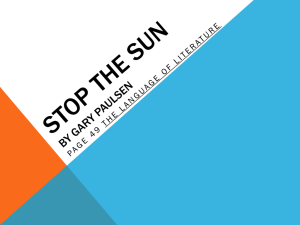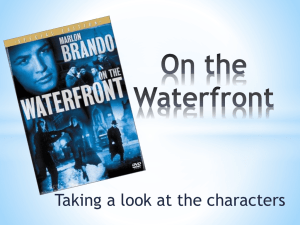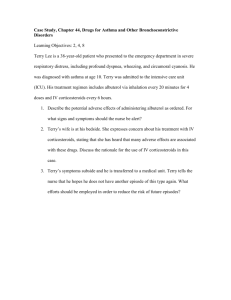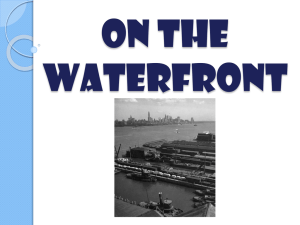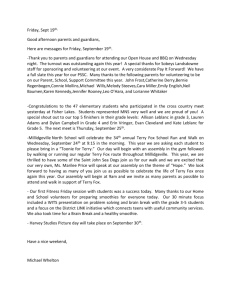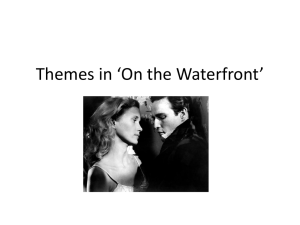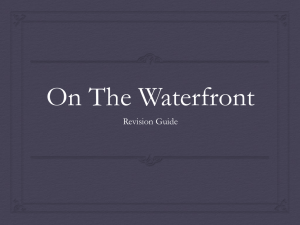On The Waterfront – Study Notes
advertisement
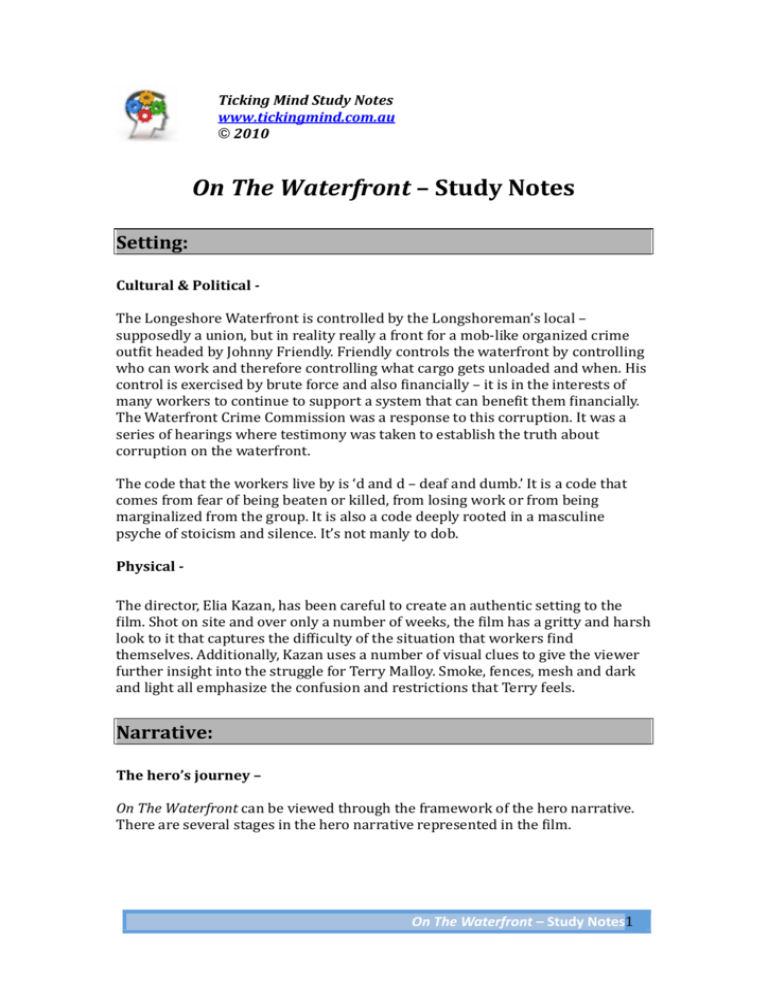
Ticking Mind Study Notes www.tickingmind.com.au © 2010 On The Waterfront – Study Notes Setting: Cultural & Political -­ The Longeshore Waterfront is controlled by the Longshoreman’s local – supposedly a union, but in reality really a front for a mob-­‐like organized crime out>it headed by Johnny Friendly. Friendly controls the waterfront by controlling who can work and therefore controlling what cargo gets unloaded and when. His control is exercised by brute force and also >inancially – it is in the interests of many workers to continue to support a system that can bene>it them >inancially. The Waterfront Crime Commission was a response to this corruption. It was a series of hearings where testimony was taken to establish the truth about corruption on the waterfront. The code that the workers live by is ‘d and d – deaf and dumb.’ It is a code that comes from fear of being beaten or killed, from losing work or from being marginalized from the group. It is also a code deeply rooted in a masculine psyche of stoicism and silence. It’s not manly to dob. Physical -­ The director, Elia Kazan, has been careful to create an authentic setting to the >ilm. Shot on site and over only a number of weeks, the >ilm has a gritty and harsh look to it that captures the dif>iculty of the situation that workers >ind themselves. Additionally, Kazan uses a number of visual clues to give the viewer further insight into the struggle for Terry Malloy. Smoke, fences, mesh and dark and light all emphasize the confusion and restrictions that Terry feels. Narrative: The hero’s journey – On The Waterfront can be viewed through the framework of the hero narrative. There are several stages in the hero narrative represented in the >ilm. On The Waterfront – Study Notes1 2 On The Waterfront – Study Notes • Ordinary World The opening scenes of the >ilm orients us to the world ruled by Johnny Friendly’s gang. In this world people like Joey Doyle are killed for not abiding by the code of ‘D&D’ • Mistakes, ?laws and guilt Terry Malloy unwittingly helps facilitate the murder of Joey by calling him to the roof of the apartment. He thought Friendly’s goons were just going to ‘lean on him.’ He is guilty now for his part in Joey’s murder. His hero’s journey must in part be about atoning for what he has done. • Call to adventure The crime commission visit Terry, encouraging him to tell what he knows about Friendly’s corruption. Edie also begins her own investigation asking Terry what he knows. • Refusal of the call Terry refuses to tell what he knows about corruption, reinforcing the culture of silence that exists: “I don’t know nothing, I haven’t seen nothing, I’m not saying nothing.” • Mentor Father Barry mentors Terry, telling him he needs to testify before the Waterfront Crime Commission. If he doesn’t tell the truth – “How much is your soul worth…?” • Tests, allies, enemies Terry develops a relationship with Edie. Edie is Joey’s brother and urges Terry to tell what he knows. Johnny Friendly is concerned that Terry is now too close to Edie. He sends Charley to force Terry to make a choice – to be on the inside or the outside. Terry decides to be with Edie. Charley is killed. Terry’s response is to testify before the Crime Commission. • Ordeal Terry testi>ies before the Crime Commission. He now needs to suffer being banished from the waterfront – he is considered a ‘pigeon’ and a ‘cheese.’ Despite this, he physically stands up to Friendly, but is beaten by Friendly’s goons. • The road back & Ressurrection After being beaten by Friendly’s goons, Terry is able to get up and walk into work. He is not truly beaten and is able to lead the waterfront workers peacefully into work. Characters: Terry: Terry’s a character with very little self af>irmation. He feels that he is a “bum” and his stupidity is constantly being emphasized by the condescending attitude of those around him, in particular Johnny Friendly who wonders, “why didn’t you go to college like your brother Charley.” The only way he knows how to navigate this world is to guilessly follow Friendly and his gang, to look out for number one and to, “Do it to him before he does it do you.” He is careful to stick to the strict masculine code of silence and never to ask questions – “I don’t know nothing, I haven’t seen nothing, I’m not saying nothing.” But Terry has an innate sense of right and wrong. He admires the simple and honest life of his pigeons – “Boy, they sure got it made: eating, sleeping, >lying around like crazy” – and their loyalty. He knows too that speaking up about Joey’s murder is the right thing to do, but doing the right thing con>licts with a powerful sense of self preservation – “Me? I’m with me – Terry.” A number of forces operate on Terry to alter his position. Firstly, his relationship with Edie shows him that there can be genuine care between humans and life doesn’t just need to be a cynical struggle to look out for yourself. Secondly, Father Brother shows him that speaking the truth can be a heroic and masculine action. Thirdly, his loyalty to his own brother Charley means he is able to overcome his fear of speaking out. Johnny Friendly: Johnny establishes early in the >ilm some of his motivations as a character. He came from a struggling family and fought hard to work his way up from powerlessness to power. “I didn’t work my way up from that for nothing,” he says. Because of his struggle he feels he is entitled to power. Power and status are important parts of his identity. The ‘d and d’ code signify the loyalty he commands – without it he would be just “another fella around here.” Edie: Apart from Edie there are only two other female >igures in the >ilm – her neighbour who has lost her son to a waterfront killing, and the woman in the pub getting married. Edie represents a feminine opposite to the brute, uncaring masculine world of the waterfront: “Shouldn’t everybody care about everybody On The Waterfront – Study Notes3 4 On The Waterfront – Study Notes else…isn’t everybody part of everybody else,” she says to Terry. She is loyal to the men in her life and will >ight for them. Firstly for her brother Joey, then for her father (she struggled with Terry to get a token so her father could work), and then to Terry who she tries to protect by urging him to >lee from the waterfront. She is heroic – but ultimately it is the masculine heroism of Terry’s world that is more important. Father Barry: Father Barry is shamed into acting on the crime on the waterfront by Edie’s accusation that he was ‘hiding’ in his church. Father Barry represents a man of peace who can still be considered brave in the masculine world of On The Waterfront. Physically, he is an imposing character – tall and strong with a powerful speaking voice. He doesn’t shirk from hitting Terry to stop him shooting Tullio and his speech after Kayo is killed in the hull of a cargo ship that – “Anybody who stands around and lets it happen…shares the guilt as much as the Roman soldier who pierced the >lesh of our Lord” – is an act of courage. It is Father Barry who encourages Terry to get up off the ground after being beaten by Friendly’s goons at the end of the >ilm and to walk by himself to work (despite Edie’s protestations). He knows the importance of masculine bravery. Charley: Charley is the “deep thinker” or the brother with “brains.” As Friendly’s right hand man he has been deeply compromised by the corrupt world of the waterfront. He has been so compromised in fact, that he has failed to take care that his brother develops his own identity. Instead, Terry becomes “owned” by Friendly – his identity subsumed by Friendly’s world. “You was my brother Charley…you should have looked out for me,” Terry says to Charley as he rides in the back of cab with him after being given the choice to be on the inside or the outside. Ultimately Charley is loyal to Terry – realizing that he has failed his brother. Themes: Loyalty: There are different networks of loyalty operating in On The Waterfront. Johnny Friendly’s union commands loyalty, in the form of silence, from its workers. Friendly in particular commands the personal loyalty from his goons close to him – his right hand man, Charley, then Tullio, JP, Big Mac and of course Terry. However, there are loyalties which con>lict with his. Edie’s loyalty to her brother means she wants to break the code of silence. Charley’s loyalty to his brother means he can no longer be loyal to Friendly. Then there is also Father Barry’s demand for loyalty to the truth, conscience and to your duty for state. Conscience & Courage: Everyone is talking about “conscience” says Terry towards the middle of the >ilm. The thing about conscience, for the men of the waterfront, is that it seemingly has no place in their everyday life. These are men struggling to get work to pay the rent. They are not compromising their conscience to live lavish lives – they are simply trying to exist. As Terry puts it: “A steady job and a couple of extra potatoes…that’s all I want.” The men show by their attendance at Father Barry’s >irst gathering in the church that they agree that the union is corrupt and something should be done, but nobody wants to be the >irst to break the silence. Ultimately it is individual acts of courage that inspire the whole. Signi>icantly, it is not Terry testimony that inspires, but his and then Pop Doyle’s individual confrontation of Johnny Friendly. Symbols & Techniques: Dark & Light: Dark and light feature signi>icantly in the scene when Terry and Charley are riding together in the back of a cab. Charley has given Terry a choice – to become part of the corruption, or to turn his back on it and put himself in jeopardy. Throughout the entire scene dark and light >lash across both their faces reinforcing the harsh reality of the choice. Pigeons: Like doves, pigeons are something we might normally associate with peace. In fact in the opening scene, when Terry calls to Joey that he has his pigeon, he releases it into the air like a peace offering. This is in symbolic contrast to the murder which then happens. Terry admires many things about the pigeons – they’re “loyal” for one. This attribute taps into the powerful theme of loyalty that pervades the text. Pigeons are also on the bottom of the power hierarchy. As Terry sees himself threatened by the power of Johnny Friendly, he notes that: “You know this city is full of hawks…they hand around on top of the big hotels, they spot a pigeon – then they’re right down on top of them.” Further to this, ‘pigeon’ is also slang for ‘ratting’ to the police. On The Waterfront – Study Notes5 6 On The Waterfront – Study Notes Fences & Mesh: Many scenes with Terry and Edie happen with fences in the background or mesh or netting between them. This symbolizes the obstacle of the code of silence between them that Terry feels he cannot get past. The Mantle of The Jacket: Clockwise from top left: Pop Doyle gives Dugan Joey’s jacket; Terry with his jacket open with Edie in the bar scene; Dugan zips his jacket up before dying; Big Mac zips his jacket up before dropping the sling on Dugan; Father Barry zips up Terry’s jack before he makes his walk Jackets are important symbols in On The Waterfront. To begin with, Joey’s jacket becomes a mantle -­‐ a symbol of de>iance that is handed on to those who stand up to the corrupt union. First, it is given to Dugan who agrees to testify to the Crime Commission about corruption on the waterfront. After he dies, it is returned to Edie who gives it to Terry. He wears it in his dramatic >inal confrontation with Johnny Friendly. Secondly, the jackets the men wear in On The Waterfront are like an armour or shield against the outside. They are usually zipped up tight -­‐ ostensibly to keep out the cold, but symbolically also to protect their masculinity. In several key scenes characters zip up their jackets -­‐ as if summoning their courage -­‐ before acts of masculinity. On the other hand, an open jacket shows that their guard has been let down. We can see this in the scene where Terry talks to Edie in the bar. Mist & Smoke: Terry faces a dilemma of conscience in On The Waterfront. “There’s a lot more to this,” he says to his brother Charley. He is confused about what to do and what to say. Terry’s moral confusion is emphasised through the use of mist (coming from the waterfront) and smoke (in the park in front of the church). The scene above shows Terry and Edie walking through the park in front of the church after Johnny Friendly’s goons have broken up Father Barry’s meeting. The smoke comes from drum >ires. At this point Terry is attracted to Edie -­‐ but confused by his guilt about his involvement in her brother’s death. Open Spaces & Con?ined Spaces: Clockwise from top left: Charley gives Terry an ultimatum in the back of a cab; Terry and Edie escape from a truck in an alley; Terry sitting before testifying at the Crime Commission; Terry, Edie and Tommy on the roof of Terry’s apartment block Spaces represent the dif>icult circumstances characters >ind themselves in in On The Waterfront. Often characters are pictured huddled or close together in extreme close ups or medium shots. The con>inement of their space represents how they feel trapped by circumstances. The famous scene between Terry and On The Waterfront – Study Notes7 8 On The Waterfront – Study Notes his brother Charley in the back of the cab is a particularly good example of this. The scene is stif>ling, the sweat visible on the characters, as they chew over the tough choices they face. On the other hand, the roof top space for Terry is an open space -­‐ a place where he can indulge in the gentle, domestic chores of looking after pigeons and be removed from the restrictions of life on the waterfront. Music: Part of Bernstein’s soundtrack to the >ilm is foreboding, even military sounding music. The opening scene features threatening sounding drums and brass, which foretell not just the murder about to happen, but set the scene for this landscape as one of con>lict. The other music theme are the gentler strings that typically accompany the scenes between Terry and Edie and indicate hope. It is interesting that both musical themes are intertwined in the >inal scene of the >ilm -­‐ with Terry’s walk accompanied by the theme of hope, but the closing of the door accompanied by the more military notes that have previously gone with scenes of con>lict. This represents the ambiguity of the >inal scene. Father Barry says, “You’ve lost the battle...but can win the war.” Yet the foreboding closing of the roller door at the end suggests differently -­‐ they may have won a battle, but will things really change? Boxing: Boxing is an interest of a number of characters in the text. Terry was a ‘prize-­‐ >ighter’ as a younger man, but is frustrated that he was unable to achieve his potential because Johnny and Charley asked him to deliberately lose an important >ight in order for them to clean up on some bets. At the end of the >ilm, Terry boxes Johnny reliving that >ight that he could have won as a younger man. He loses only because he is overwhelmed by Johnny’s goons. But he heroically gets up, urged on by Father Barry that Johnny has a bet that he will stay on the >loor. This tactic from Father Barry is important, because boxing is an important motivator for Terry – it is a sign of his masculinity and his potential as a man. Glover, the Crime Commissioner, has also used this tactic on Terry. He tells Terry that he had seen him box and wonders why he lost a >ight it looked like he could win. Signi>icantly, Glover’s name is a reference to boxing. Elia Kazan also used a number of real boxers in the >ilm – three of Friendly’s goons are played by real former heavy weight boxing champsions. Quotes: Terry: I >igured the worst they were going to do was lean on him a little bit. Terry: Wow, he wasn’t a bad kid that Joey. Woman: He was the only longeshoreman who had the guts to talk to the crime commission. Pop Doyle: I kept telling him – don’t tell nothing…you live long. Father Barry: Remember time and faith are great healers. Father Barry: I’m in the church if you need me. Big Mac: What mind? Johnny Friendly: I didn’t work my way up from that for nothing. Friendly: Everything moves in and out we take a cut. Charley: Why shouldn’t it – we’re entitled to it. Terry: Boy, they sure got it made: eating, sleeping, >lying around like crazy. Dugan: If I was a wiseguy I wouldn’t have been a longeshoreman for 30 years. I’m poorer now than when I started. Terry: I don’t know nothing, I haven’t seen nothing, I’m not saying nothing. Father Barry: This is my parish. I don’t know how much I can do, but I’ll never >ind out if I come down here for myself. Pop Doyle: Letting her see things which ain’t >it for the eyes of a decent girl. Father Barry: Is this all you do, just take it like this? Charley: When Johnny wants a favour, don’t think about it! Father Barry: 1) The working conditions are bad 2) They’re bad because the mob does the hiring, 3) The only way to break the mob is to stop letting them get away with it. Father Barry: How can we call ourselves Christians and protect these murderers with out silence? Edie: How can you just sit there and say nothing? Father Barry: Are you going to keep still until they cut you down one by one. Dugan: We’ve always been D&D – deaf and dumb. Dugan: Are you will to go all the way? Father Barry: You stand up and I’ll stand up with you. Terry: Me I’m with me – Terry. On The Waterfront – Study Notes9 10On The Waterfront – Study Notes Edie: That’s what makes people mean and dif>icult – people don’t care enough about them. Pop Doyle: Charley…a butcher in a camel-­‐hair coat. Edie: He tries to act tough…but there’s a look in his eye. Terry: I’m the original golden warrior. Terry: You know this city is full of hawks…they hand around on top of the big hotels, they spot a pigeon – then they’re right down on top of them. Terry: One thing about them is that they’re very loyal. Terry: Johnny Friendly bought a piece of me… Edie: Shouldn’t everybody care about everybody else…isn’t everybody part of everybody else. Terry: Do it to him before he does it do you. Terry: Everybody’s got a racket. Terry: Down here it’s everyman for himself. Edie: It’s living like an animal. Edie: Help me if you can for godsakes. Terry: Quit worrying about the truth all the time and worry about yourself. Edie: Much, much more. Terry: I knew he had the guts. Friendly: That crummy pigeon… Father Barry: I came down here to keep a promise…Kayo was one of the fellas who had the gift of standing up. Father Barry: Anybody who stands around and lets it happen…shares the guilt as much as the Roman soldier who pierced the >lesh of our Lord. Father Barry: This is my church! Terry: They’re nervous. There was a hawk around here before. Terry: It started out as a favour…a favour – who am I kidding – it’s do it or else. Terry: She’s the >irst nice thing that’s happened to me. Father: How much is your soul worth if you don’t? Father: Let me tell you, you’ve got some other brothers. Father: It’s your own conscience that has to do the asking. Terry: I would have had a title shot. Terry: When those guys wanna win a bet there’s nothin’ they won’t stop at. Charley: This girl and her father have their hooks in so deep he doesn’t even know which way is up anymore. Charley: I can’t do that…he’s my kid brother. Terry: A steady job and a couple of extra potatoes…that’s all I want. Charley: You’re pushing 30…it’s time for you to get some ambition. Terry: There’s more to this than I thought. Terry: You was my brother Charley…you should have looked out for me. Terry: I could have had class. I could have been a contender. I could have been someone…instead of a bum. Edie: Let’s get away – some place we can live in peace. Edie: Terry, please don’t do anything. Father Barry: You want to be brave…>iring lead into another man’s >lesh isn’t being brave. Father Barry: Fight him in the courtroom…with the truth. Tommy: A pigeon for a pigeon. Edie: Are they taking chances for you? Why should you? Terry: They always said I was a bum. Well, I’m not a bum, Edie…I’m just going to go down there and get my rights. Terry: You take them heaters away from you and you’re nothing…you’re nothing…I was rattin’ on myself all those years and I didn’t even know it… Pop Doyle: All my life you’ve pushed me around… On The Waterfront – Study Notes11 12On The Waterfront – Study Notes Father Barry: Finish what you started.
